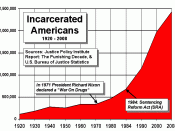Andrew Phelps
ECI 350
Paper #3
Often in Law Enforcement the question of sentencing is a very tough one. The Sentencing Reform Act of 1984 created the Federal Sentencing Commission; they developed some guidelines for individuals and organizations. There are two types of sentencing determinate and indeterminate, both have their benefits, but the question was raised as to which is a better approach to sentencing for an economic crime.
Determinate sentencing is a sentence of a fixed number of years the sentence isn't changed because of good behavior, or how well they are liked by the corrections officers, if they are sentenced too twenty years they are in prison for twenty years.
Indeterminate sentencing being basically the opposite of determinate, it sets up a range of time to be served by the offender. In this case many offenders get off early because of good behavior or just maybe luck because they make parole.
This method is often unfair due to many officers making favorites in the security system and taking revenge on others they personally don't like.
Since indeterminate sentencing is bias sometimes and can't be completely reliable, determinate sentencing is a better choice for the sentencing of economic crimes.
Determinate sentencing is seen as one concept, it appears to be comprised of two independent factors which can be considered separately. These factors are equity in sentencing and predictability of release. Providing inmates with information concerning their release dates, has been shown to motivate inmates, as when they don't know they perform poorly and their corporation levels are lower because they anxious to be released. (Marvell09) There is a certain Psychological effect you could say on being able to predict when you were going to be released. For many inmates this doesn't put the stress of having to go to...


